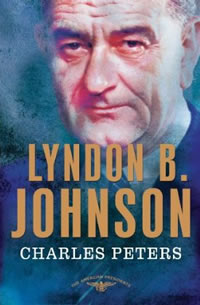Book Notes
 Charles Peters, Lyndon B. Johnson (New York: Times Books, 2010), 199pp.
Charles Peters, Lyndon B. Johnson (New York: Times Books, 2010), 199pp.
If like most people you don't have time to read one of the two trilogies about Lyndon Johnson (1908–1973) by Robert Caro or Robert Dallek, this brief biography by Charles Peters is a reliable and readable substitute. Peters admires Johnson, but he is by no means uncritical. His ten short chapters make brisk reading, and revolve around Johnson's personal foibles, his domestic legislative victories, and his foreign policy failure in Vietnam.
Many people remember Johnson for his crude and abusive behavior, and with good reason. He inherited from his father Sam a propensity for heavy drinking (by one account, a fifth of scotch per day), a passion for politics even while in college, and boundless ambition. Johnson had a volatile personality, a "gift for sycophancy," a reckless swagger about numerous affairs (with little care to hide them), and a propensity to humiliate his staff in public. He once described an ideal staff person as "someone who will kiss my ass in Macy's window and stand up and say, 'Boy, wasn't that sweet.'"
Johnson arrived in Washington in 1931 to work for the Texas congressman Richard Kleberg, and stayed there for all but two of the next thirty-seven years, when in 1968 he withdrew from the presidential election and Richard Nixon followed him. Historians remember Johnson for his legislative mastery, and in particular for his passage of the Civil Rights Act of 1964, the Voting Rights Act of 1965, and the passage of Medicare. But these "historic measures" stand in "stark contrast" to his failure in Vietnam. In Peters' view, Johnson bore his own blame for the disaster in southeast Asia, but many others were complicit, namely, the press, both political parties, all except one of Johnson's national security advisors, and even the whole country. Until his last year in office, most people agreed with his prosecution of the war and so his ratings remained high.
Recent history has been kinder to Johnson than the later opinion of his own day. Peters places him in a category of great presidents just below the top tier of Washington, Lincoln, and Roosevelt. "Of all our presidents," he writes, "only Franklin Roosevelt can match Johnson's legislative record." And no one did more for blacks and the cause of civil rights since Abraham Lincoln (157, 159). As for his dark personality, his wife's secretary concluded, "That's just him. You have to face the fact that he was that way. You had to accept him warts and all."


